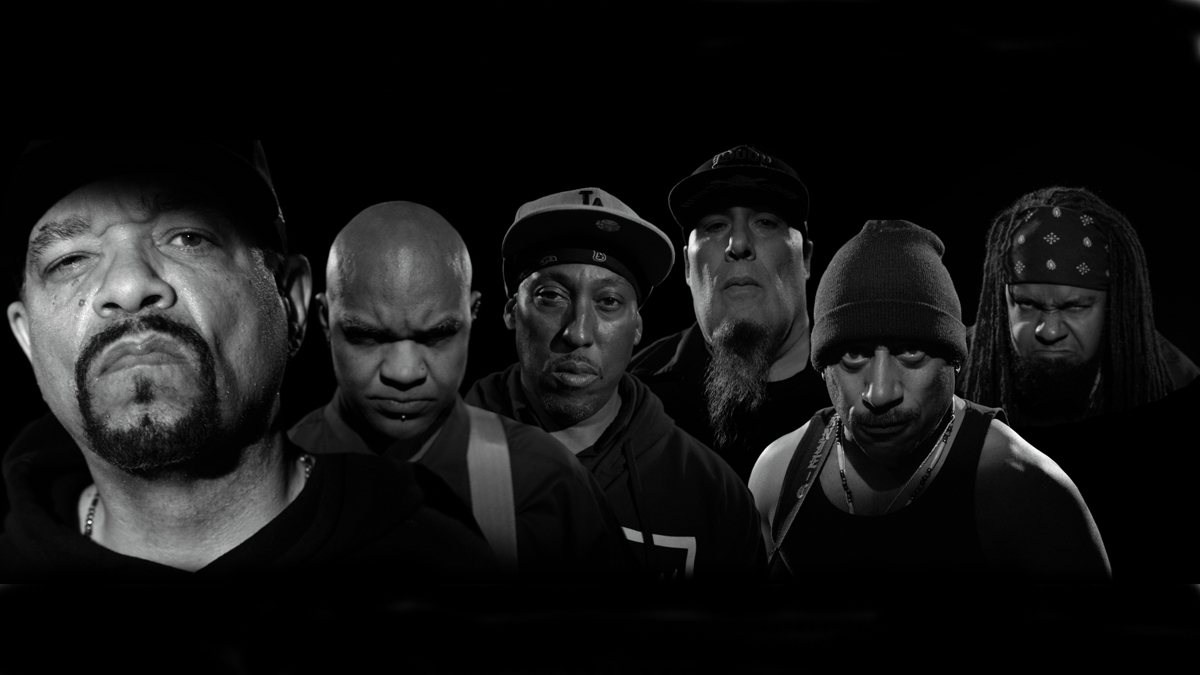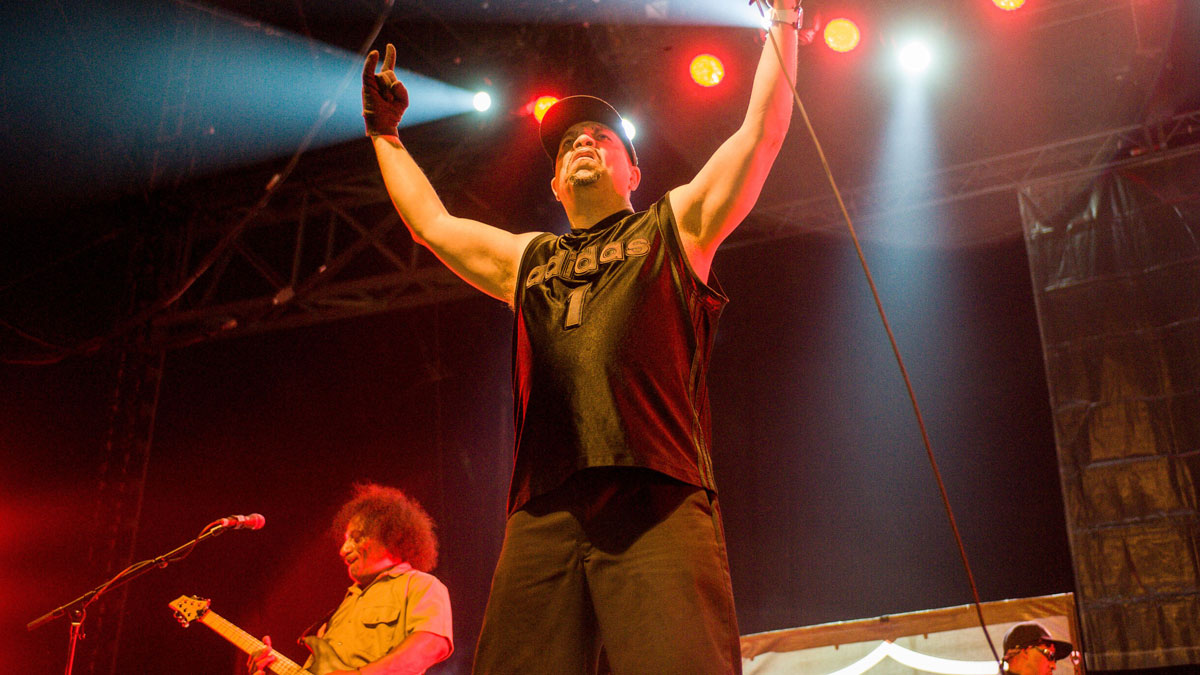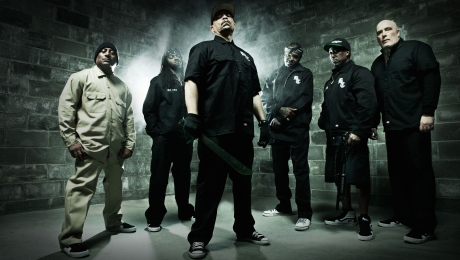Ernie C talks Bloodlust, producing Black Sabbath and 25 years of Body Count
Guitarist on Ice-T-fronted metallers' return

'Music kept us out of trouble...'
If you’re talking about bands that have taken their share of hard knocks over the years, then you’ll want to spare a few words for Body Count.
The rap-metal pioneers were put together as the '80s rolled into the '90s by Ice-T and guitarist Ernie C. The pair had known each other since their days at LA’s notorious Crenshaw High School and joined forces alongside Beatmaster V (drums), D-Roc (rhythm guitar) and Mooseman (bass) to form Body Count.
This was no powder-puff vanity project. The band’s self-titled debut was a stunningly powerful slab of thrash punk. But, this flourishing band quickly found itself mired in controversy due to the furore surrounding the track Cop Killer. The fallout saw frontman Ice-T become a target for everyone from Tipper Gore to then-President Bush.
Body Count kept on fighting, but the body blows showed no sign of letting up. The band lost three members between 1996 and 2004. First, drummer Beatmaster V passed away from leukaemia. Next, founding bass player Mooseman was shot and killed in 2001, before D-Roc died from lymphoma complications in 2004. Ice and Ernie C were left as the only original members of Body Count still alive.
In typical Body Count style, the band battled on, bringing in new members and putting out 2006 album Murder 4 Hire. The losses had, however, taken their toll and when Body Count went on hiatus in the wake of Murder 4 Hire, it was unclear whether they would return.
Would they fight back for another round? Of course they would. With 2014’s Manslaughter and its subsequent world tour, Body Count proved that they were still very much a going concern. Plus, they’ve backed it up by putting out their second album in three years, Bloodlust.
As the record’s 31 March release date draws near, we spoke to Ernie C about Body Count’s triumphs and tribulations. Oh, and also that time that he produced a little band called Black Sabbath.
What was your first exposure to rock and metal music?
“I lived in Detroit in the '60s down the street from a guy named Dennis Coffey. He had a band called Dennis Coffey and the Detroit Guitar Band. They were my first exposure to the guitar.
“I moved to Los Angeles and started playing guitar in the early '70s. I started listening to commercial R&B music, the stuff that was on the radio. My first exposure to rock guitar music was Ernie Isley from the Isley Brothers: they had a record called 3 + 3 and that was the stuff I wanted to play. That was my first inspiration to play guitar. Parliament Funkadelic as well, that was the only R&B guitar music you would hear on the radio at that time.
“Later on, a guy gave me some records like Led Zeppelin and Deep Purple and that was it for me. That put me on the path.”
Ice makes my playing digestible. Sometimes, if you’re just writing a record with guitar players, it’ll be like a Steve Vai record with notes all over the place
Were you self-taught?
“I consider myself to be self-taught, but I took a few lessons. I would go way across town at 12 years old and pay $10 an hour for guitar lessons. The guy would teach me songs.
“Music kept us out of a lot of trouble [at Crenshaw High]. The gangsters liked musicians; they knew the musicians weren’t gang-banging. Music has helped me out.”
When did Ice come onto the scene? Was that at Crenshaw High?
“I met Ice at high school - this was 1975. When he got back from the army, he said he was starting to do this thing called rap music, which was brand new at that time. He said he wanted some guitar in his music and he started doing that. We were fusing the rock with the rap from then.”
Body Count first appeared on Ice’s Original Gangster album. Was there a plan for that to be a launchpad for Body Count?
“There was no plan; the plan was just for me to play guitar. That was before we even had D-Roc on rhythm guitar. We were just high-school friends playing on a song. That song got some attention, so we became a band. There was no master plan, it just happened. It was just a way for us to stop borrowing money from Ice - we started a band to make some money [laughs].”
From a songwriting perspective, how does your relationship with Ice work?
“Ice makes my playing digestible. Sometimes, if you’re just writing a record with guitar players, it’ll be like a Steve Vai record with notes all over the place. Ice makes it easy for people to relate to.
“We might write something super-complicated and he’ll say, ‘What is that?!’ On our last two records, we have written songs in a room together as a band so we can work things out.
“Believe it or not, we are playing pop music. We don’t call it that because the word pop will kill us, but we are trying to make something for the masses. We’re not trying to make an album that is too hard to follow.”
Don't Miss

Body Count breaks through
Your first major tour was the 1991 Lollapoloza when you would play during Ice’s set. Was that a difficult experience being a brand-new band trying to get yourselves over in 15 minutes or so?
“That was the right amount of time for us to play because we were brand-new. We didn’t have an hour’s worth of songs. We played for 20 minutes - that wasn’t long enough for people to get bored with us. Ice did his rap set and then we came on for 20 minutes.
“The response was very good - it encouraged us a whole lot. We couldn’t have asked for more from the crowd. Before we played Lollapalooza we had only played 11 shows - we were still figuring out what the band was. We weren’t a rap-rock band, we were a metal band.
“We toured with DRI when we first formed. When we first started playing and on our first record we were more of a punk band. We were a little looser back then; now the band is real precise. We were a band from South Central LA, we were what the band was supposed to be.”
Did the Lollapalooza tour give you the confidence to press on and go into the studio to record your first album?
“We were still writing the record when we were on that tour. We had Cop Killer written. We played Cop Killer for a year before we caught any flak for it. We played it and everyone loved it; it was a good punk song. Later on we recorded it and then caught all the flak in 1992.”
We weren’t a rap rock band, we were a metal band. We toured with DRI when we first formed
You were public enemy number one off the back of Cop Killer…
“That was difficult and it took away from the band. MTV had big plans they were going to do with us and then after Cop Killer everyone dropped us and left us for dead. The second record [Born Dead] was better than the first record but the Cop Killer thing took away from the band.
“People didn’t see us as a real band. They would talk about us as ‘the rap artist’. We were lost in the shuffle. The band would have been a lot more successful without that. Cop Killer made us famous but it didn’t make us money.”
Jumping on to 2014 album Manslaughter, that was your first record in eight years. How big an album was that for you, especially as it showed that your audience was still there?
“We lost three members and we kept on going but it didn’t feel right. We tried all kinds of combinations and we decided to take a break, breathe and grieve. We grieved for eight years.
“One day, Ice asked if we were ready to come back, and we were. We had Will [drums] and Vince [bass] in the band and we got Juan [Garcia] on guitar and that was the right mix. We recorded Manslaughter and it was well received.
“We went on tour with Korn and Avenged Sevenfold and a lot of people had never seen us before. We’d do meet and greets and the kids would say, ‘Oh, the guy from Law & Order has a band now’ and ‘we can relate to Cop Killer; you should put that song out!’ They thought Manslaughter was our first album and we were some old guys with a new band [laughs].”

From Forbidden to Bloodlust
You’re about to release new album, Bloodlust, your second in three years. Was the plan to keep the band out there while you’re in a good groove?
“We get together and play a few times a week and we enjoy each other’s company, so making another record made sense. The band is getting better. Manslaughter was like our first record. It’s like this is our Born Dead, but this band is in a better place now.”
You bust out a huge riff on No Lives Matter, where did that come from?
“We jammed out ideas like No Lives Matter. We had a house that we rented and we stayed in the house and we would go rehearse for eight or nine hours a day and jam. All of the riffs just came out.”
It has a powerful lyrical message as well…
“Lyrically, not many bands have something to say today. That is what this band is: we haven’t shied away from anything in 25 years so why should we now?
“Ice and I were talking that in the last eight years everyone got real complacent. Obama was in the office and he was good but everybody got kind of comfortable. Trump’s only been in a month and things are already shaken up. He flipped the table in 30 days. I hope more bands come out and say something. You can’t keep on writing songs about going to the club; you’ve got to say something.”
Dave Mustaine guests on the album; how did that come about?
“We’ve known Dave since 1988. We were going to be on a Megadeth record years ago. Ice and Dave started talking again on Twitter and Ice asked Dave to be on the record. We sent him a track and he sent back a part and he did a perfect job - we couldn’t have asked for more.”
Coming onto your production work, what are your thoughts today on Forbidden, the 1995 Black Sabbath album that you produced?
“Well, Ice sampled War Pigs on his very first album. We got a call from Tony Iommi while we were in London one time saying he wanted to meet me and he wanted me to produce a Black Sabbath record. I thought, ‘Wow, this is great.’ Miles Copeland suggested me to him. Tony came down and asked me and I was like, ‘Really? Have you got the right guy?’ It was the most surreal moment of acceptance in the rock ’n’ roll world for me.”
Not too long after that album Ozzy returned to Sabbath. Was the band showing signs of splitting with Tony Martin during the recording process?
“Tony Martin had some big shoes to fill and Tony Iommi would say to him, ‘Ozzy would do it like this,’ or ‘Dio would do it like this.’ That was not easy for Tony Martin.
“I said to Iommi that he should jam with Ozzy. My whole thing is that nothing is that serious that you can’t get back together. It’s music: if you don’t like someone, put it aside for your fans. We were going to get Moose, Body Count’s bass player, back in the band before he passed away, so I understand that if you have an ability to play while everyone is alive then you should do it.”
I worked on Cozy Powell’s drums for days and then he handed me a tape and said, ‘Listen to these drums, this is the way my drums sound, I’m Cozy Powell.’
Was Iommi open to your input on guitar parts and tone?
“He knew what he wanted. I wanted to dry up the sound. At that time he was going for a big wet, room sound but they didn’t really want to change that much. They were trying to change but they didn’t.
“I worked on Cozy Powell’s drums for days and then he handed me a tape and said, ‘Listen to these drums, this is the way my drums sound, I’m Cozy Powell.’ I did the record the way they wanted. That’s what made me not want to produce records any more; I’m fine with just playing. That was a great experience, though - it was very surreal.”
You were also involved with Rage Against The Machine and Stone Temple Pilots in their early days. What was your role there?
“I wasn’t involved a whole lot. I took [RATM] out on the road with us and Tom asked me what songs I liked. Stone Temple Pilots as well, I helped them get their management. But I knew that both of those bands would find their way with or without me.
“I heard Rage play at rehearsals and they played their first record, and all of those songs were good. There was a good energy. I don’t see energy like that in new bands today.”
Don't Miss
Rich is a teacher, one time Rhythm staff writer and experienced freelance journalist who has interviewed countless revered musicians, engineers, producers and stars for the our world-leading music making portfolio, including such titles as Rhythm, Total Guitar, Guitarist, Guitar World, and MusicRadar. His victims include such luminaries as Ice T, Mark Guilani and Jamie Oliver (the drumming one).
